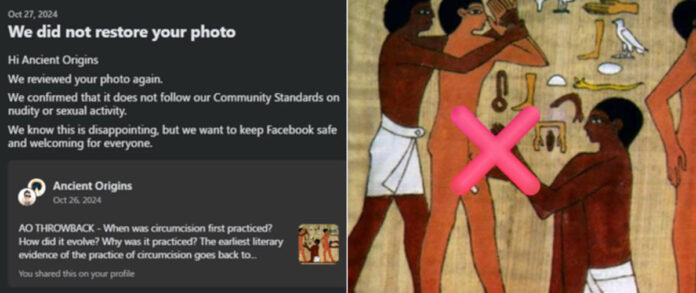Facebook has once again blocked Ancient Origins for posting content deemed inappropriate. This seems to happen almost every month, with the site being suspended for a significant period each time. We are uncertain if this image will pass Facebook’s automated censorship system, but at this point, we have little to lose.
Here are the latest problematic images. Last month, Ancient Origins was suspended for sharing images from an Egyptian papyrus depicting the process of circumcision in Egypt. Warning: the following images contain nudity.
Papyrus showing ancient Egyptian men undergoing circumcision. (archivohistoria/CC BY 4.0)
Even after appeal, this image was deemed in violation of Facebook’s rules regarding nudity or sexual content.

Is Facebook correct in their judgment, or should Ancient Origins reconsider their moderation standards?
This week, the issue has revolved around an article showcasing a bog body, resulting in a violent content violation. Viewer discretion is advised.

A bog body, severed at the waist, known as Clonycavan Man. (CC BY-SA 2.0)
While these images may not be suitable for all viewers, it begs the question of whether they pose a societal threat. Ancient Origins has faced previous blocks for sharing images of Egyptian mummies and nude statues.
Is Facebook’s cautious approach justified? Share your thoughts in the comments section.
Why the Issue Persists
It is crucial to acknowledge the challenging task Facebook moderators face in reviewing a vast number of images, many of which can be disturbing, to prevent unsuspecting users from encountering them. However, there seems to be a gap in the pre-filtering stage where AI may be falling short.
Social media platforms were once celebrated as digital town squares for free expression, news dissemination, and idea-sharing. In recent times, these platforms have assumed a moderation role, regulating and censoring content. Despite the intention to curb harmful speech and misinformation, the execution often falls short.
Increasingly, innocent posts with opinions, historical narratives, or essential storytelling images are being penalized, impacting small publishers. This occurs while harmful content somehow slips through the cracks.
The Quest for Civil Discourse
Striking a balance akin to civilized society poses a challenge. The town square should offer a space for free speech and expression, respecting others’ right to a comfortable public environment free from offensive behaviors.
In a structured society, norms and checks safeguard individuals to some extent. ‘Freedom of speech’ does have limits, such as prohibitions against inciting violence or hatred. Similarly, in social media spaces, new acceptability rules have emerged, sometimes disregarding established societal norms.
Whereas an individual shouting obscenities in public would drive away bystanders, alternatives exist in traditional public spaces. Similarly, social media platforms are diversifying, offering uncensored outlets for free speech alongside curated safe spaces like Facebook.
The onus is on leading platforms like Facebook to adapt, fostering open and civilized spaces mirroring real-world norms. Failure to do so might pave the way for competitors to dominate the market with better solutions.
New platforms like Bluesky are emerging, aiming to uphold ‘freedom of speech without freedom of reach,’ allowing individuals to control their engagements. The evolution of social media spaces will ultimately lead to a more civil environment. Facebook needs to refine its approach swiftly before competitors seize the opportunity.
Top image: Right screenshot of Facebook’s censorship notice. Right; Egyptian circumcision papyrus. Source: archivohistoria/CC BY 4.0




